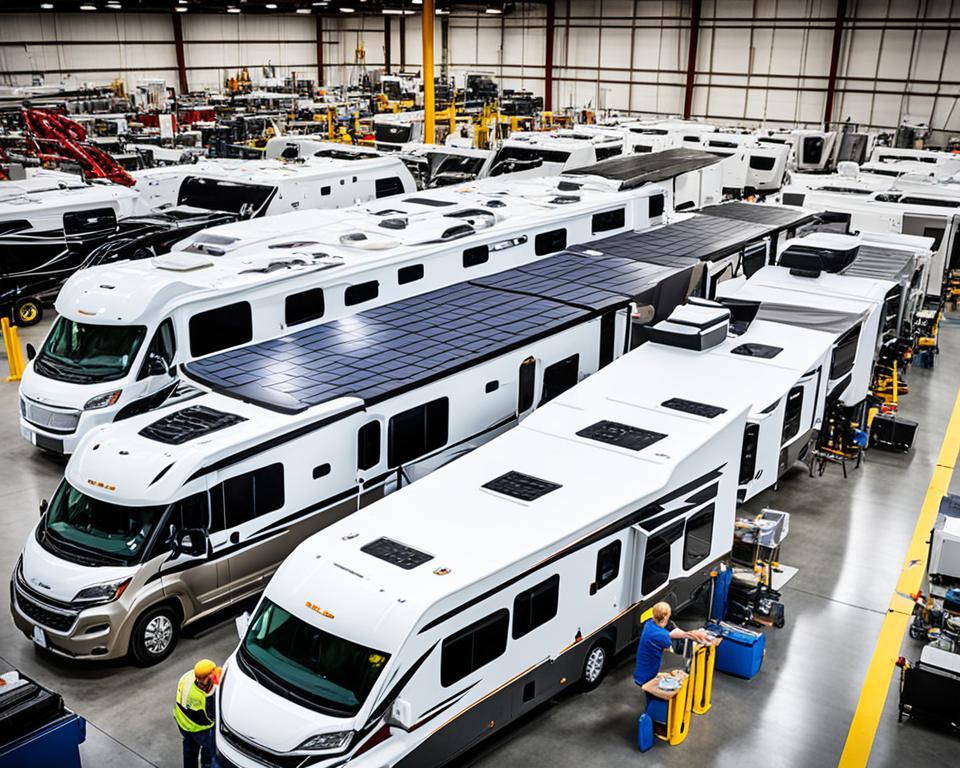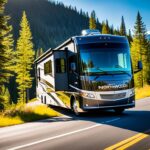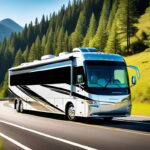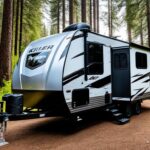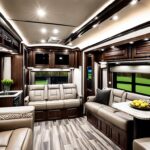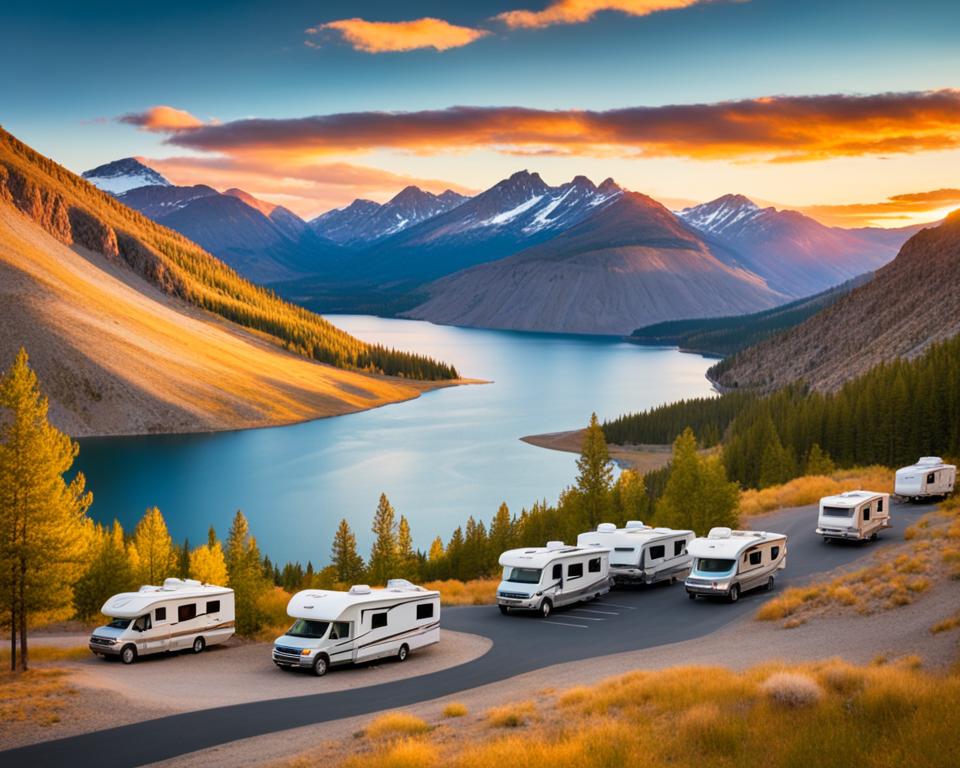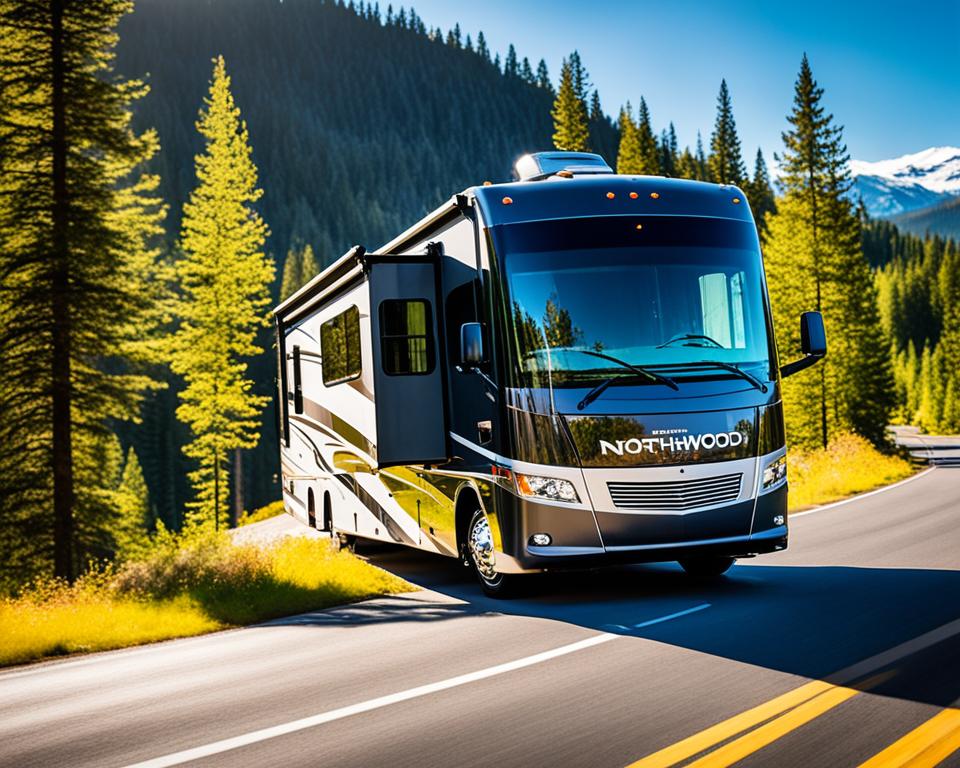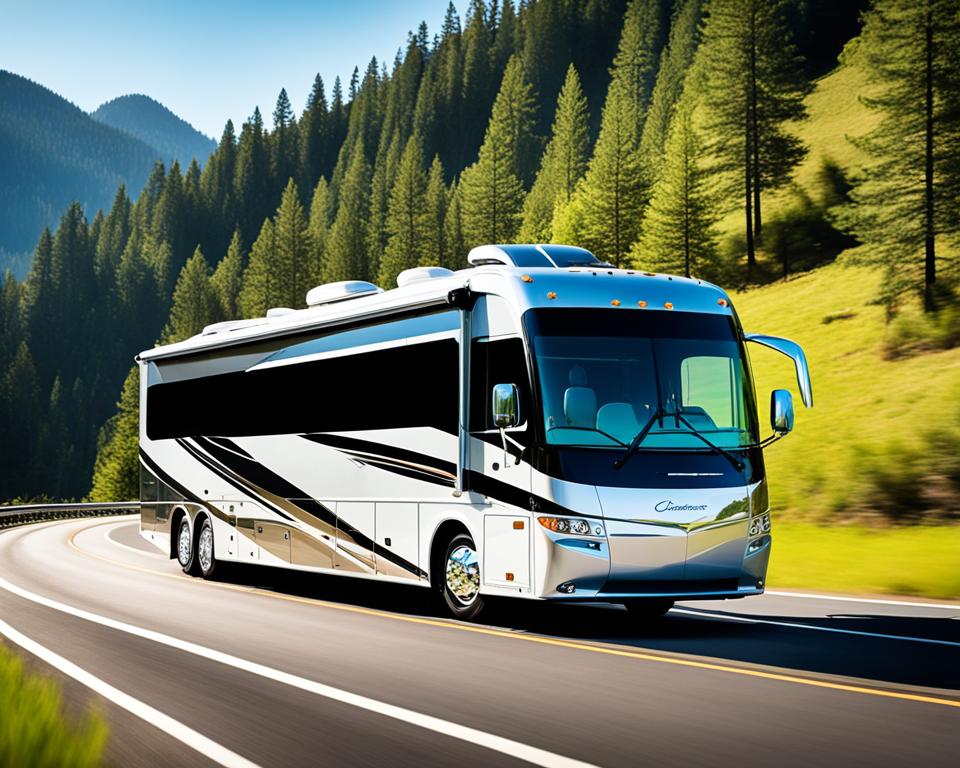The recreational vehicles (RV) industry has been experiencing steady growth and transformation in recent years. With the increasing demand for RVs for both commercial and home use, the RV market has become a thriving sector of the automotive industry. RVs are motorized or non-motorized vehicles designed for temporary accommodation, equipped with essential amenities such as kitchens, bathrooms, bedrooms, and living spaces.
The global RV market size was valued at USD 49,964.79 million in 2022 and is projected to reach USD 70,907.58 million by 2028, with a compound annual growth rate (CAGR) of 6.01% during the forecast period. This growth can be attributed to factors such as changing consumer preferences, technological advancements, and sustainability initiatives.
Within the RV industry, there are various types of vehicles available, including towable RVs and motorhomes. Motorhomes are further classified into three classes: Class A, Class B, and Class C. Towable RVs encompass travel trailers, fifth wheel trailers, pop-up campers, and toy haulers, catering to different needs and preferences of RV enthusiasts.
Key Takeaways:
- The global RV market is projected to reach USD 70,907.58 million by 2028.
- RVs are motorized or non-motorized vehicles designed for temporary accommodation.
- The RV market offers a wide range of choices, including towable RVs and motorhomes.
- The market growth is driven by changing consumer preferences and technological advancements.
- Sustainability initiatives have gained traction in the RV industry, promoting eco-friendly practices.
Leading Manufacturers in the Recreational Vehicle (RV) Market
When it comes to the recreational vehicle (RV) market, there are several leading manufacturers that dominate the industry. These companies have established themselves as key players, producing high-quality RVs that cater to the diverse needs and preferences of RV enthusiasts. Let’s take a closer look at some of the top manufacturers in the RV industry:
- REV Recreation Group
- MAXUS
- Knaus Tabbert
- NeXus RV
- Triple E Recreational Vehicles
- Gulf Stream Coach
- Swift Group
- Riverside RV
- Rapido Group
- Forest River
- HL Enterprise
- Trigano
- Northwood Manufacturing
- THOR Industries
- Winnebago Industries
- Pleasure-Way Industries
- Hobby-Wohnwagenwerk
These recreational vehicle manufacturers bring decades of experience and expertise to the market, consistently delivering innovative and top-quality RVs that meet the needs of RV enthusiasts worldwide. Whether you’re looking for motorhomes, travel trailers, or camper vans, these leading manufacturers offer a wide range of options to suit various lifestyles and preferences.
Growth Drivers of the Recreational Vehicle (RV) Market
The growth of the recreational vehicle (RV) market is primarily driven by several key factors that contribute to the increasing demand for RVs. These factors play a significant role in driving the growth and development of the RV industry, shaping its future and trends.
Factors Driving RV Market Growth
- Increasing Disposable Income: As disposable income levels rise, more individuals and families are able to afford the luxury of owning an RV, contributing to the growth of the market. RVs offer a unique way to travel and explore, providing comfort, convenience, and a sense of home on the road.
- Rising Interest in Outdoor Recreational Activities: The growing interest in outdoor recreational activities, such as camping, hiking, and road trips, has fueled the demand for RVs. People are seeking opportunities to reconnect with nature and enjoy adventures, leading them to choose RVs as their preferred mode of travel and accommodation.
- Changing Consumer Preferences: Consumer preferences have evolved over time, with more individuals and families embracing the RV lifestyle as a way to escape the hustle and bustle of city life and experience the freedom of the open road. RVs provide a flexible and customizable travel experience, allowing users to create their own itineraries and explore remote destinations.
“The increasing demand for RVs can be attributed to factors such as rising disposable income, a growing interest in outdoor recreational activities, and changing consumer preferences.” – RV industry expert
In addition to these drivers, the COVID-19 pandemic also played a significant role in boosting the growth of the RV market. As people sought safe and flexible travel options, RVs emerged as a popular choice, allowing individuals and families to maintain social distancing while enjoying the comforts of home on their journeys.
| Growth Drivers of the RV industry | Description |
|---|---|
| Increasing Disposable Income | Rising income levels enable more people to afford RV ownership and travel. |
| Rising Interest in Outdoor Recreational Activities | Growing desire to engage in outdoor activities drives RV demand. |
| Changing Consumer Preferences | Shift towards flexible travel experiences and exploration of remote destinations. |
| COVID-19 Pandemic | Surge in RV sales as people sought safe and flexible travel options. |
The growth drivers of the RV industry continue to shape its trajectory, paving the way for innovative advancements and opportunities within the market. As demand for RVs remains strong, manufacturers and industry players strive to meet the evolving needs and preferences of consumers.
Types of Recreational Vehicles (RVs) in the Market
The recreational vehicle (RV) market offers a diverse range of vehicles, catering to different travel preferences and lifestyles. Whether you prefer the convenience of a motorhome or the versatility of a towable RV, there is an option for everyone. Let’s explore the various types of RVs available in the market:
Motorhomes
Motorhomes are fully self-contained RVs that come with living amenities and a built-in engine. They provide a comfortable and convenient way to travel, with the ability to drive and live in the same vehicle. Motorhomes are further classified into three main classes:
- Class A Motorhomes: These are the largest and most luxurious motorhomes available. They offer spacious interiors, upscale features, and all the comforts of home. Class A motorhomes are built on a specially designed chassis and often include luxurious amenities such as full-size kitchens, multiple bathrooms, and high-end furnishings.
- Class B Motorhomes: Also known as “camper vans,” Class B motorhomes are compact and agile. They are built on a van chassis and usually feature a small kitchen, bathroom, and sleeping area. Class B motorhomes are perfect for solo travelers or couples looking for a more maneuverable and fuel-efficient RV.
- Class C Motorhomes: Class C motorhomes are built on a truck chassis and have a distinctive over-the-cab sleeping area. They offer a good balance between the spaciousness of Class A motorhomes and the compactness of Class B motorhomes. Class C motorhomes typically include a bedroom, bathroom, kitchen, and living area, making them a popular choice for families.
Towable RVs
If you prefer the flexibility of using your own vehicle for everyday transportation, towable RVs are a great option. These types of RVs are towed behind a separate vehicle and come in a variety of styles:
- Travel Trailers: Travel trailers are one of the most common types of towable RVs. They range in size from compact trailers to larger models that can accommodate multiple occupants. Travel trailers often feature a kitchen, bathroom, sleeping areas, and dining/living spaces.
- Fifth Wheel Trailers: Fifth wheel trailers are similar to travel trailers but require a pickup truck with a specialized hitch for towing. Their unique design allows for increased stability and a more spacious interior. Fifth wheel trailers often have multiple levels, with separate living and sleeping areas.
- Pop-up Campers: Pop-up campers are lightweight and compact RVs, perfect for adventurers who want a more rugged camping experience. They are collapsible and can be easily towed by most vehicles. Despite their compact size, pop-up campers can still offer amenities such as sleeping areas, kitchenettes, and dining spaces.
- Toy Haulers: Toy haulers are a specialized type of towable RV that combines living quarters with a dedicated storage area for outdoor recreational gear, such as motorcycles, ATVs, or bicycles. They allow outdoor enthusiasts to bring their favorite toys along on their RV adventures.
With such a wide range of RV types to choose from, it’s important to consider your specific needs and preferences when selecting the right RV for your travel adventures.
Technological Advancements in the RV Industry
The RV industry is constantly evolving and embracing technological advancements to enhance the RVing experience. With the integration of smart technology, RVs today offer a range of innovative features that improve convenience, safety, and sustainability.
One of the key advancements in the RV industry is the integration of touchscreen control panels. These panels allow RV owners to easily control and monitor various systems and amenities within their vehicles. From adjusting temperature settings to managing lighting and entertainment systems, touchscreen control panels provide a user-friendly interface that simplifies RV operation.
Moreover, mobile app integrations have become increasingly popular, enabling RV owners to control and monitor their vehicles remotely. Through smartphone apps, RVers can access information about their RV’s battery levels, tank capacities, and even locate their vehicles using GPS capabilities. This level of connectivity and control enhances the RVing experience, allowing for greater flexibility and peace of mind.
Another significant technological advancement in RVs is the integration of onboard Wi-Fi. With onboard Wi-Fi capabilities, RVers can stay connected during their travels, allowing them to access the internet, stream media, and stay in touch with loved ones. This feature is particularly beneficial for remote workers or those who require reliable internet connectivity while on the road.
Furthermore, the RV industry is making strides in advancing safety systems within RVs. Advanced safety features such as collision avoidance systems, blind spot detection, and lane departure warnings help RV owners navigate the roads with confidence and reduce the risk of accidents. These systems provide an additional layer of protection, especially for larger RVs that may require more attention while driving.
As the industry continues to prioritize environmental consciousness, there is a growing focus on eco-friendly RVs. Manufacturers are incorporating sustainable practices and technologies to create RVs that minimize their carbon footprint. Electric or hybrid models, solar power systems, and lightweight materials are being integrated to improve fuel efficiency and reduce reliance on fossil fuels. These eco-friendly RVs not only contribute to a greener future but also help RV owners save on fuel costs.
In summary, the RV industry’s technological advancements are revolutionizing the way RVers experience their journeys. With smart technology integration, convenient features like touchscreen control panels and mobile app integrations enhance the overall RVing experience. Onboard Wi-Fi and advanced safety systems provide additional convenience and safety while on the road. Simultaneously, the industry’s focus on eco-friendly RVs ensures a greener and more sustainable future for enthusiasts while also helping them save on fuel costs.
Sustainability Initiatives in the RV Industry
The RV industry recognizes the importance of sustainability and is taking significant steps to reduce its environmental impact. Manufacturers are implementing various initiatives to promote eco-friendly practices and integrate sustainable technologies into RV design and construction. These efforts aim to support a more sustainable future for the industry and align with the growing demand for eco-conscious travel options.
Solar Power Systems for Reduced Reliance on Generators
Solar power is gaining popularity in the RV industry as a sustainable energy solution. RVs equipped with solar power systems can harness the sun’s energy to charge batteries and power onboard appliances, reducing dependence on traditional generators. This not only reduces carbon emissions but also allows RVers to enjoy quiet and eco-friendly camping experiences.
Energy-Efficient LED Lighting for Reduced Energy Consumption
The use of energy-efficient LED lighting is another prominent sustainability initiative in the RV industry. LED lights consume significantly less energy compared to traditional incandescent bulbs, making them an ideal choice for RVs. By replacing conventional lighting with LEDs, RVers can reduce energy consumption and extend battery life, while providing bright and efficient illumination inside their vehicles.
Incorporation of Lightweight Materials for Improved Fuel Efficiency
Weight reduction is a key focus in the development of sustainable RVs. Manufacturers are incorporating lightweight materials such as aluminum, fiberglass, and composites in the construction of RVs. These materials not only contribute to improved fuel efficiency but also enhance the overall performance and handling of the vehicles. Lightweight RVs allow travelers to reduce their carbon footprint while enjoying a more eco-friendly and economical travel experience.
“The RV industry is committed to promoting sustainability and reducing its environmental impact through the implementation of innovative technologies and materials.”
– RV Industry Association
By embracing sustainability initiatives like solar power systems, energy-efficient lighting, and lightweight materials, the RV industry is paving the way for a greener and more eco-friendly future. These initiatives not only benefit the environment but also provide RVers with more sustainable and enjoyable travel experiences.
| Sustainability Initiatives in the RV Industry | Benefits |
|---|---|
| Solar Power Systems | – Reduces reliance on generators – Lower carbon emissions – Quiet and eco-friendly camping |
| Energy-Efficient LED Lighting | – Reduces energy consumption – Extends battery life – Provides efficient illumination |
| Lightweight Materials | – Improved fuel efficiency – Enhances vehicle performance and handling – Eco-friendly and economical travel |
Off-Grid Capabilities in RVs
To cater to the growing demand for remote and off-grid travel experiences, RV manufacturers are developing vehicles with off-grid capabilities. These include improved battery systems, increased water and waste storage capacity, and rugged chassis designs to handle rough terrain. These off-grid capabilities allow RVers to explore remote destinations without relying on traditional campground facilities.
RV enthusiasts who crave adventure and exploration beyond the confines of established campgrounds are turning to off-road RVs with rugged chassis designs. These specially crafted vehicles are built to withstand challenging terrains, ensuring a smooth and safe journey regardless of the road conditions.
One of the key features of off-road RVs is their durable chassis design. These vehicles are equipped with reinforced frames, heavy-duty suspension systems, and rugged tires that provide enhanced stability and durability. The rugged chassis design allows RVers to venture off the beaten path and explore remote locations with ease.
In addition to their off-road capabilities, these RVs are equipped with advanced battery systems that can store and deliver sufficient power to operate essential amenities while off-grid. This ensures a comfortable and convenient experience for travelers, even in remote areas where access to electricity is limited.
Furthermore, off-grid RVs are designed with increased water and waste storage capacity. These larger tanks enable RVers to extend their time off-grid by minimizing the frequency of refilling fresh water and emptying wastewater. This allows for longer periods of self-sufficiency and independence while enjoying nature’s beauty.
The off-grid capabilities of these RVs open up a world of possibilities for outdoor enthusiasts. Whether it’s boondocking in the wilderness, embarking on off-road adventures, or simply enjoying the tranquility of secluded locations, off-grid RVs provide the freedom to go wherever the heart desires without sacrificing comfort and convenience.
“Off-grid RVs with rugged chassis designs are the perfect choice for those seeking thrilling off-road experiences without compromising comfort and amenities.” – RV Enthusiast
Interior Design Innovations in RVs
RV manufacturers are constantly pushing the boundaries of interior design, finding innovative ways to maximize space and create functional and comfortable living areas. By incorporating multi-functional furniture and clever design features, they are revolutionizing the RV experience.
One of the key focuses in modern RV design is maximizing interior space. With limited square footage available, every inch counts. To address this challenge, manufacturers are introducing convertible beds that can transform into seating areas or storage spaces when not in use. These versatile furniture pieces allow RV owners to adapt the layout to their needs, making the most of the available space.
Another trend in RV interior design is the integration of fold-away tables. These tables can be easily folded and stowed away when not needed, freeing up valuable floor space. Whether it’s for dining, working, or socializing, these tables provide a convenient solution without compromising on functionality.
Flexible seating areas have also become a popular feature in modern RVs. These seating arrangements can be reconfigured to accommodate different activities or accommodate additional guests. Whether it’s a comfortable lounge area during the day or a cozy sleeping space at night, the flexibility of the furniture ensures that RV owners can make the most of their RV’s interior.
To give you a glimpse of the innovations in RV interior design, here are some examples:
| RV Interior Innovation | Description |
|---|---|
| Convertible Beds | Beds that can transform into seating areas or storage spaces, maximizing space utilization. |
| Fold-Away Tables | Tables that can be easily folded and stowed away when not in use, freeing up floor space. |
| Flexible Seating Areas | Seating arrangements that can be reconfigured to accommodate different activities or additional guests. |
These interior design innovations are revolutionizing the RV experience, allowing RV owners to make the most of their living spaces and create personalized and functional environments.
“The innovative interior design features in modern RVs have truly transformed the way people experience the open road. With convertible beds, fold-away tables, and flexible seating areas, RV owners can enjoy a comfortable and optimized living space while traveling.”
Rise of the Sharing Economy in the RV Industry
The RV industry is undergoing a significant transformation with the rise of the sharing economy. This trend has been fueled by the emergence of RV sharing platforms and peer-to-peer rental services, providing alternative options for travelers. Instead of purchasing an RV, individuals can now rent from RV owners, allowing more people to experience the joys of RV travel without the long-term commitment of ownership.
RV sharing platforms connect RV owners with travelers seeking a unique and adventurous travel experience. These platforms create a trusted marketplace where RV owners can list their vehicles for rent, and travelers can easily browse through a wide selection of RVs available in their desired location. This peer-to-peer rental model not only benefits travelers by offering a cost-effective alternative to traditional accommodations but also allows RV owners to monetize their assets when not in use.
The sharing economy has revolutionized the way we think about travel, making it more accessible and inclusive. It promotes a sense of community and encourages individuals to connect and share resources, fostering a spirit of adventure and exploration. With the increasing popularity of RV sharing platforms, individuals have the opportunity to embark on memorable road trips, discover new destinations, and create lasting memories with loved ones.
Whether it’s a family vacation, a weekend getaway, or a solo adventure, peer-to-peer RV rentals offer a flexible and convenient solution for travelers. The wide variety of RVs available on these platforms allows individuals to choose the perfect vehicle that suits their needs and preferences. From compact campervans to spacious motorhomes, there is an RV for every traveler and every journey.
“The rise of RV sharing platforms and peer-to-peer rental services has transformed the RV industry, providing alternative options for travelers to experience the joy of RV travel without the commitment of ownership.”
So, why limit your travel options when you can explore the open road in an RV? Embrace the sharing economy, discover new destinations, and create unforgettable memories on your next adventure.
Benefits of Peer-to-Peer RV Rentals
| Benefits | Description |
|---|---|
| Cost-effective | Rent an RV for a fraction of the cost of ownership, including maintenance, storage, and insurance expenses. |
| Flexibility | Choose the RV that best suits your travel needs, whether it’s a compact camper or a luxurious motorhome. |
| Convenience | Enjoy the convenience of having your accommodations and transportation in one, eliminating the need to book hotels or rental cars. |
| Adventure | Embark on a unique and adventurous travel experience, exploring off-the-beaten-path destinations and discovering hidden gems. |
| Community | Connect with a community of RV enthusiasts and fellow travelers, sharing experiences and recommendations. |
Remote Work and RV Travel
With the rise of remote work, many professionals are embracing the RV lifestyle as a way to combine work and travel. This trend has paved the way for RV manufacturers to cater to the needs of remote workers and digital nomads by incorporating dedicated workspaces and improved connectivity options in their designs.
RVs for remote workers are equipped with functional work areas that provide a comfortable and productive environment. These workspaces often include a designated desk or table where individuals can set up their laptops, monitors, and other work essentials. Some RV models also feature ergonomic seating options, ensuring that remote workers can maintain proper posture and avoid discomfort while working.
Connectivity is crucial for remote work, and RV manufacturers understand this. They are equipping their vehicles with enhanced internet connectivity options, such as built-in Wi-Fi networks and mobile data capabilities, to ensure that remote workers stay connected to their colleagues and clients wherever they go.
“Working remotely from an RV allows me to experience the freedom and flexibility of travel while still meeting my professional commitments. With a dedicated workspace and reliable connectivity, I can work comfortably on the road and explore new destinations during my downtime. It’s the perfect balance!” – Sarah, Digital Marketing Manager
The RV lifestyle also appeals to digital nomads, individuals who leverage technology to work and travel simultaneously. These adventurous souls can take their work on the road, exploring new destinations and immersing themselves in different cultures while earning a living. RVs provide them with the mobility and convenience they need to support their nomadic lifestyle.
RV travel allows remote workers and digital nomads to experience the best of both worlds. They can work during the day and then unwind by exploring nature, visiting national parks, or simply enjoying the scenic views from their RVs.
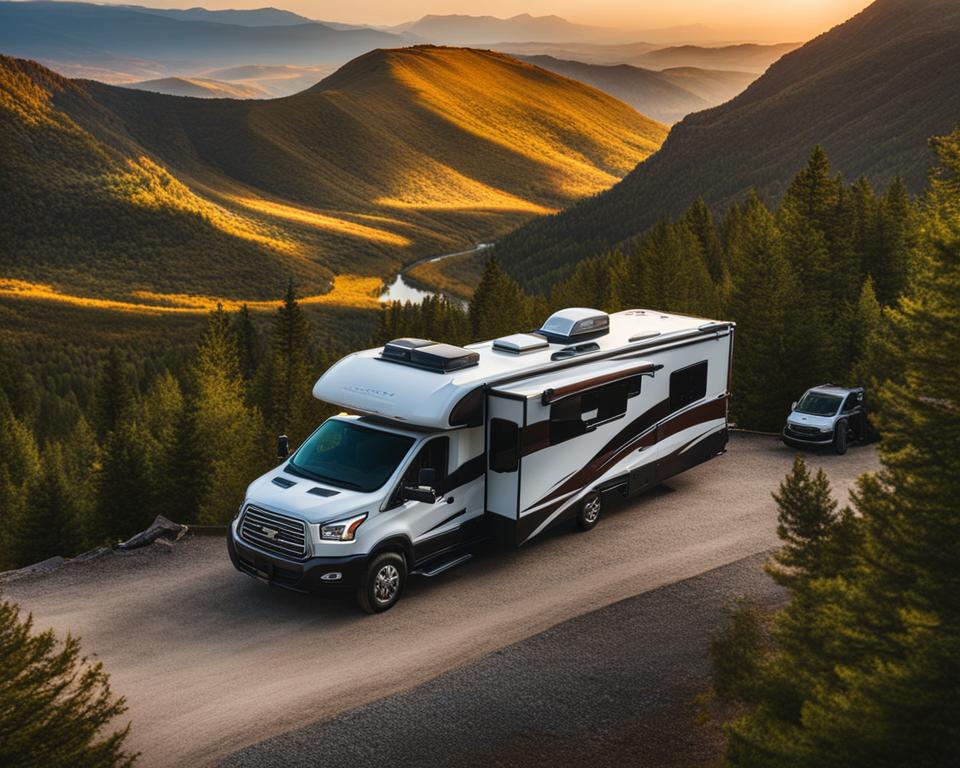
| Benefits of RV Travel for Remote Workers and Digital Nomads |
|---|
| Flexibility to work from anywhere |
| Opportunity to explore new destinations while meeting work commitments |
| Ability to create a comfortable and productive work environment in the RV |
| Freedom to customize the RV workspace to individual preferences |
| Access to beautiful natural surroundings and outdoor activities during leisure time |
| Ability to network and connect with other like-minded remote workers and digital nomads in RV parks and communities |
Whether you’re a remote worker seeking a change of scenery or a digital nomad craving adventure, the RV lifestyle offers a unique opportunity to combine work and travel seamlessly. RV manufacturers continue to innovate, creating vehicles that cater to the needs of the modern workforce, making it easier than ever to embark on an RV journey while staying productive and connected.
Catering to Diverse Consumer Demands in the RV Industry
The RV industry is experiencing a surge in popularity among a diverse range of consumers, including younger travelers, retirees, and an increasing number of female RVers. To meet the unique needs and preferences of these different demographics, manufacturers have expanded their offerings to include a wide variety of RV models and services.
For adventure-oriented travelers, there are specialized RV models designed to enhance outdoor experiences. These rugged and versatile vehicles are equipped with features like off-road capabilities, reinforced chassis, and ample storage space for adventure gear. Whether it’s exploring mountain trails or camping in remote locations, these RVs provide the necessary amenities while catering to the adventurous spirit of younger travelers.
On the other end of the spectrum, luxury motor homes have gained popularity among upscale customers seeking the ultimate RV experience. These high-end vehicles offer lavish interiors, state-of-the-art amenities, and premium finishes. From spacious living areas to top-of-the-line kitchen appliances, these motor homes provide all the comforts of home, allowing customers to travel in style and luxury.
Furthermore, the RV industry has witnessed a significant increase in the number of female RVers. Recognizing the unique needs of female travelers, manufacturers have focused on creating RV models tailored to their preferences. These RVs may feature innovative storage solutions, enhanced security features, and stylish interiors designed to appeal to female RVers.
Younger travelers, including millennials and Gen Z, are increasingly drawn to the freedom and flexibility offered by RV travel. To cater to this demographic, manufacturers have embraced modern design elements and technology integration. RVs designed for younger travelers often feature sleek and contemporary interiors, mobile app connectivity, and smart home automation systems. These tech-savvy RVs provide an elevated travel experience that resonates with the younger generation.
In summary, the RV industry has evolved to meet the diverse demands of consumers. With specialized models for adventure-oriented travelers, luxury motor homes for upscale customers, RVs tailored for female RVers, and tech-savvy options for younger travelers, manufacturers are ensuring that there is an RV to suit every lifestyle and preference.
Conclusion
The recreational vehicles industry is undergoing rapid growth and transformation as consumer preferences, technological advancements, and sustainability initiatives shape its trajectory. With a wide range of RV types and models available in the market, manufacturers and enthusiasts must stay informed about the latest trends and developments to make informed decisions and adapt to the changing landscape.
As consumers seek diverse experiences and lifestyles, the RV industry is evolving to meet their unique needs. From motorhomes to towable RVs, there is a vehicle for every adventure and travel style. Technological advancements such as smart features and eco-friendly options are enhancing convenience, safety, and sustainability in RVs.
Moreover, the rise of the sharing economy has introduced new avenues for RV enthusiasts. Peer-to-peer rental platforms offer alternatives to traditional ownership, allowing more people to experience the joy of RV travel without the commitment. Remote work is also influencing the industry, with RV manufacturers catering to the needs of digital nomads by providing dedicated workspaces and improved connectivity options.
To ensure continued success in this dynamic industry, manufacturers and enthusiasts must keep a pulse on the latest trends. By embracing innovation, sustainability, and catering to the diverse demands of consumers, the RV industry will thrive and provide memorable travel experiences for years to come.
FAQ
What is the global recreational vehicle (RV) market size?
The global RV market size was valued at USD 49964.79 million in 2022 and is expected to reach USD 70907.58 million by 2028.
What types of vehicles are included in the RV industry?
The RV industry offers towable RVs, including travel trailers, fifth wheel trailers, pop-up campers, and toy haulers, as well as motorhomes, which are further classified into Class A, Class B, and Class C motorhomes.
What are the leading manufacturers in the RV industry?
The leading manufacturers in the RV industry include REV Recreation Group, MAXUS, Knaus Tabbert, NeXus RV, Triple E Recreational Vehicles, Gulf Stream Coach, Swift Group, Riverside RV, Rapido Group, Forest River, HL Enterprise, Trigano, Northwood Manufacturing, THOR Industries, Winnebago Industries, Pleasure-Way Industries, and Hobby-Wohnwagenwerk.
What are the growth drivers of the RV market?
The growth of the RV market is driven by factors such as increasing consumer disposable income, rising interest in outdoor recreational activities, changing consumer preferences, and the surge in RV sales during the COVID-19 pandemic.
What are the technological advancements in the RV industry?
Technological advancements in the RV industry include the integration of smart technology, such as touchscreen control panels and mobile app integrations, as well as onboard Wi-Fi and advanced safety systems.
Are there sustainability initiatives in the RV industry?
Yes, the RV industry is adopting sustainability initiatives, such as the use of solar power systems, energy-efficient LED lighting, and lightweight materials in RV construction to minimize environmental impact.
Do RVs have off-grid capabilities?
Yes, RVs are being developed with off-grid capabilities, including improved battery systems, increased water and waste storage capacity, and rugged chassis designs to handle rough terrain.
How are interior spaces being optimized in RV designs?
RV manufacturers are maximizing interior space through innovative features and multi-functional furniture, such as convertible beds, fold-away tables, and flexible seating areas.
Is the sharing economy impacting the RV industry?
Yes, the sharing economy has made its way into the RV industry with the emergence of RV sharing platforms and peer-to-peer rental services, providing alternatives to traditional RV ownership.
How is remote work influencing the RV industry?
With the rise of remote work, RV manufacturers are incorporating dedicated workspaces and improved connectivity options in their designs to cater to remote workers and digital nomads.
Who is the RV industry catering to in terms of consumer demands?
The RV industry is attracting a diverse range of consumers, including younger travelers, retirees, and a growing number of female RVers. Manufacturers are offering specialized RV models for different demographics, such as adventure-oriented travelers and upscale customers.

